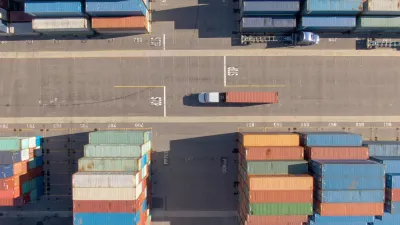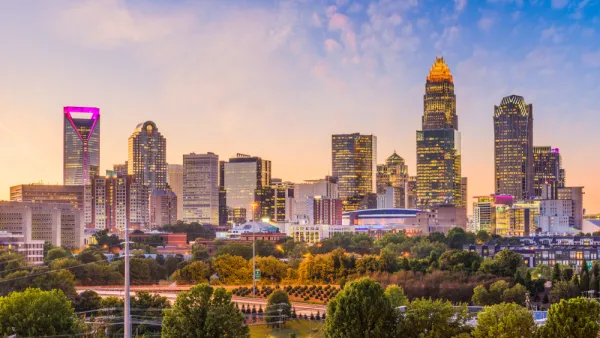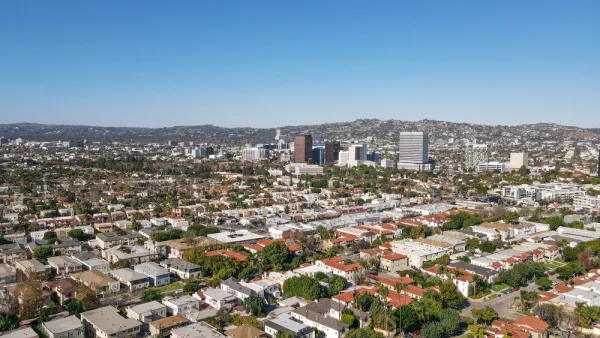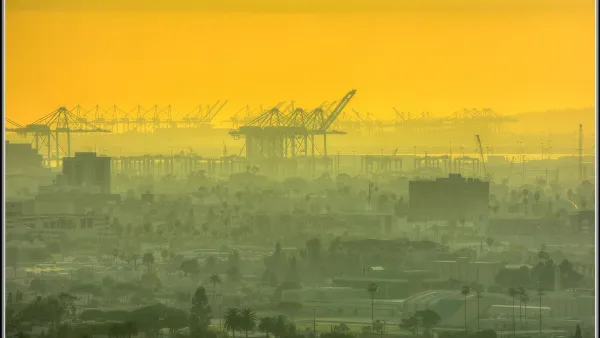Zoning has been blamed for a lot of things in recent years, but a global supply crunch increasing prices and creating shortages of household goods—and potentially ruining the holidays—is a new one.

In a story you might have missed from late October, local zoning laws in Southern California were suddenly shoved into the spotlight when the news broke that local zoning is at least partly responsible for the global supply crunch.
Now the world knows the Long Beach zoning code prevents the Port of Long Beach from stacking shipping containers more than two high. After the news went viral thanks to series of Tweets from Ryan Petersen, founder of the freight-forwarding tech company Flexport, Long Beach Mayor Robert Garcia moved quickly to temporarily suspend the limitations and allow containers to be stacked up to four high.
Multiple news channels picked up the news of the city of Long Beach's temporary zoning reforms, including:
- Supply chain crisis prompts city officials to suspend shipping container stacking limits (Long Beach Business Journal, October 22)
- Long Beach Eases Container Rules to Tackle ‘National Emergency’ (SupplyChainBrain, October 23)
- City of Long Beach allows logistics companies to stack containers higher (American Shipper, October 25)
- To Ease Storage Crisis, Long Beach Lifts Limits on Container Stacking (Maritime Executive, October 25)
- A tech CEO got big attention for his plan to ease the backlog at Los Angeles ports (NPR, November 3)
To be fair, the limitations created by the city of Long Beach's zoning code are only a part of the puzzle. Long Beach is one of two ports included in a massive port complex that also includes the Port of Los Angeles. Together, the two ports are credited as the source for about 40 percent of all shipping containers coming to the United States. According to an article by Donna Littlejohn, both ports have recently enacted a number of changes intended to speed up deliveries, such as allowing 24/7 operations and implementing a "hefty surcharge on ocean carriers for boxes that take up needed terminal dock space after a certain number of days."
Los Angeles has prepped new properties to hold overflow containers, but it hasn't, according to a new batch of Tweets sent by Petersen on November 10, relaxed its zoning restrictions on shipping container heights.
At least two commentaries suggest that California's infamous NIMBY culture and its preference for restrictive zoning regulations are to blame. An article for Bloomberg, written by Virginia Postrel, headlines its coverage of the ongoing episode with an implied criticism: "America's Supply Chain Collides With California's NIMBYism." Another article for the libertarian magazine Reason, written by Eric Boehm, piles on:
So there you have it. All it takes to get small, temporary relief from California's excessive zoning regulations is a national supply chain crisis that threatens to ruin Christmas.
The entire episode suggests that the realities of zoning codes are attracting new attention that could create the public sentiment and political will to shake the status quo. More high-profile criticism of California NIMBYism was published this week by The New York Times, with a video titled, "Blue States, You're the Problem" that faults zoning practices for the high costs of housing, displacement, and homelessness in the state.

Analysis: Cybertruck Fatality Rate Far Exceeds That of Ford Pinto
The Tesla Cybertruck was recalled seven times last year.

National Parks Layoffs Will Cause Communities to Lose Billions
Thousands of essential park workers were laid off this week, just before the busy spring break season.

Retro-silient?: America’s First “Eco-burb,” The Woodlands Turns 50
A master-planned community north of Houston offers lessons on green infrastructure and resilient design, but falls short of its founder’s lofty affordability and walkability goals.

Test News Post 1
This is a summary

Analysis: Cybertruck Fatality Rate Far Exceeds That of Ford Pinto
The Tesla Cybertruck was recalled seven times last year.

Test News Headline 46
Test for the image on the front page.
Urban Design for Planners 1: Software Tools
This six-course series explores essential urban design concepts using open source software and equips planners with the tools they need to participate fully in the urban design process.
Planning for Universal Design
Learn the tools for implementing Universal Design in planning regulations.
EMC Planning Group, Inc.
Planetizen
Planetizen
Mpact (formerly Rail~Volution)
Great Falls Development Authority, Inc.
HUDs Office of Policy Development and Research
NYU Wagner Graduate School of Public Service





























